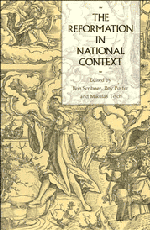13 - A Comparative Overview
Published online by Cambridge University Press: 04 December 2009
Summary
Contributors to this volume were all set an identical task: to reflect on what was distinctive about the Reformation as it appeared in the ‘national context’ assigned to each author. The essays were intended to be exercises in interpretation, rather than comprehensive surveys of the Reformation in the regions under discussion. No model or paradigm of the Reformation or its development was prescribed, no chronological boundaries were imposed, nor was any approach privileged over another - authors were free to emphasise religious, intellectual, cultural, political or social aspects as they thought fit. The result has been a collection that highlights the complexity and diversity of the Reformation as it spread out from its German origins across most of Europe during the course of the sixteenth and well into the seventeenth century.
There can be no doubt about the strongly ‘national’ character of the Reformation's appearance in different territories, states or localities. For varied reasons, and as a result of widely differing influences, the Reformation certainly had a distinctive face in Germany and Switzerland, which produced two major variants of religious reform, the Lutheran and the Helvetic. In Scandinavia and in England, it was primarily a matter of royal policy, of top-down state action which virtually ensured a slow mass diffusion. In France, it seemed from the outset doomed to no more than a disruptive minority existence, while in the Low Countries it enjoyed a pyrrhic victory by opening the way to a principle of toleration that undermined its claim to exclusiveness.
- Type
- Chapter
- Information
- The Reformation in National Context , pp. 215 - 227Publisher: Cambridge University PressPrint publication year: 1994
- 3
- Cited by



